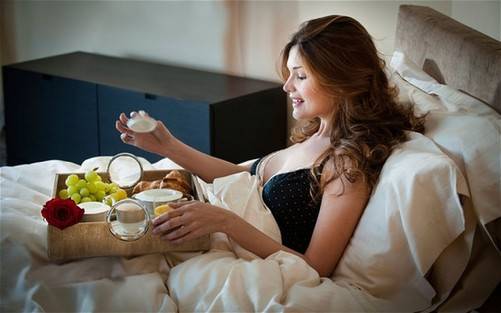外出度假時(shí)喜歡在賓館房間的床上享用早餐的人們注意了。一項(xiàng)最新研究顯示,賓館房間的衛(wèi)生間才是最適宜用餐的地方,因?yàn)槟抢镄l(wèi)生狀況最好。該研究發(fā)現(xiàn),賓館的衛(wèi)生間會(huì)定期徹底清潔,細(xì)菌含量最少;而靠墊和被子等物品則很少清潔,是賓館房間中最臟的區(qū)域。研究發(fā)現(xiàn),有五分之一的女性在賓館住宿時(shí)會(huì)有某種程度的不適反應(yīng),很多人將其歸罪與賓館提供的食物,而實(shí)際上這些不適的主要誘因是房間的衛(wèi)生狀況不佳。賓館房間中其他細(xì)菌含量較高的物品為電視遙控器和咖啡茶具。

 |
|
Mattresses and duvets are rarely cleaned, making them among the dirtiest places in the average hotel room |
Holidaymakers should think twice before taking their breakfast in bed – new research has suggested that the bathroom is actually the most hygienic place to eat in most hotel bedrooms.
While the prospect of eating a full English in the lavatory is unlikely to appeal to most travelers, the study found that, as bathrooms are regularly and thoroughly cleaned, they usually contain the least amount of bacteria.
Mattresses and duvets, however, are rarely cleaned, making them among the dirtiest places in the average hotel room.
The research, which included a poll of female travelers, was carried out by Check Safety First, a firm that offers health and safety risk management systems to hotels.
It claimed that one in five women suffer from some form of illness during a hotel stay, a statistic it says poor hygiene is responsible for.
“It is important that guests realize how poor hygiene levels in a hotel can be,” said Steve Tate, chairman of Check Safety First. “People often associate illness with the hotel food, but our auditing finds that the room can also be a major cause. With a high turnover of hotel cleaning staff, maintaining high standards is difficult, with some of the most reputable hotels not living up to these standards.”
Other places containing a high level of bacteria were television remotes, and tea- and coffee-making equipment.
相關(guān)閱讀
紐約被評(píng)為美國(guó)最臟城市 游客稱有尿騷味
(Agencies)

(中國(guó)日?qǐng)?bào)網(wǎng)英語點(diǎn)津 Helen )
